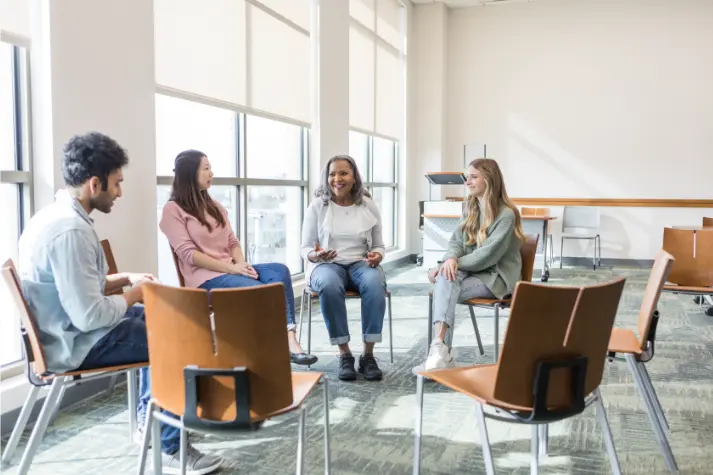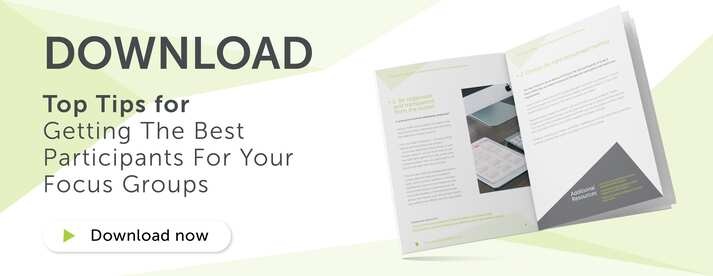
What is a Focus Group? A Beginner’s Guide with Tips and Examples
Focus groups are a dynamic and powerful method of gathering insights for your brand, product or campaign. If you're new to qualitative research, you may be wondering: what is a focus group, and how can it help you? This guide will walk you through everything you need to know – from the basics to the practicalities of running your own.
1. What is a Focus Group?
A focus group is a type of qualitative research where 6 to 10 participants are brought together to discuss a specific product, service, idea or topic. These discussions are guided by a trained moderator who ensures the conversation stays on track and everyone gets a chance to contribute.
Focus groups can be held in person, online, or over the phone, and they’re often used to gather in-depth feedback on things like marketing campaigns, new products, or brand perception.
2. Why Use Focus Groups for Market Research?
Focus groups are an excellent way to discover the attitudes of customers, prospects and other target groups on a wide variety of topics as well as helping get to the real issues and get a thorough understanding of what your customers think. One of the primary benefits of conducting a focus group is that it can directly involve the clients, who can observe the proceedings from behind a one-way mirror. As a result, the findings from the research have more credibility with the client.
The focus group environment also allows for a moderator to show stimuli to the participants – such as new products, advertising ideas, promotional concepts, or new packaging – which yields first-hand, spontaneous reactions from the respondents that reveal their attitudes toward the topic.
Another benefit of focus groups is that they enable a trained moderator to utilise the dynamics of the group to discuss topics in depth and allow the views of all the participants to be considered. This interaction among the people in the group is one of the most valuable parts of the process.
Further, the nature of the questioning can change to reflect the knowledge acquired from group to group, enabling the moderator to maximise their learning from the research process.
At a Glance: Why Run a Focus Group?
• To identify trends in buying patterns
• To get reactions to new products movies, books, fashions, political speeches, laws, or policies
• To identify a needed product or service
• To see a customer reaction to a product or service
• To test a marketing strategy (direction for an ad campaign, etc.)-4.png?width=1200&height=628&name=Untitled%20design%20(3)-4.png)
3. What is the Ideal Focus Group Size?
There is no right answer to this question. However, many focus group moderators hold a very strong point of view that 8 to 10 people is the ideal number. It is felt that if a group is larger than 10, then there are too many people to control and it is difficult to get meaningful interaction among the participants. If the group is smaller than 8, the opportunity for varied inputs is reduced.
Some people prefer to conduct mini-groups with 3 to 6 people, as they believe the smaller number of participants will provide for greater in-depth discussion. On this issue, opinions among market researchers and moderators vary.
4. How Many Focus Groups Do I Need?
The number of groups depends on several factors, including your budget, timeline and the diversity of your target audience.
In the UK, most projects run 4 to 6 focus groups. Smaller projects may only need 2 or 3, while large-scale studies might run 10 to 15 across different locations or demographics.
• The budget available for conducting the research
• How many different audience segments you need to reach
• Whether you're covering multiple geographic regions
• The depth and breadth of insights required
5. Where to Run Your Focus Group – Choosing a Venue
Focus groups are commonly held in purpose-built facilities with one-way mirrors, but they can also take place in hotels, conference rooms, or online platforms.
When selecting a focus group venue, make sure:
- It's convenient and accessible for participants
- The room is large enough for the group but small enough to feel comfortable
- It’s booked with time to spare before and after the session
- Equipment like flipcharts, whiteboards or laptops are ready in advance
- Participants are given clear directions and access information
6. How to Choose a Focus Group Moderator
This can be a very difficult task. Anyone can declare themselves a focus group moderator, so you need a stringent selection process to find the right moderator that includes a review of the candidate's qualifications and experience in conducting focus group research, as well as a look at their client list. Try to get references from other organisations who have used that moderator or go through a reputable fieldwork agency who will have good moderators on their team.
Read our blog to find out our top tips for being a successful moderator.
7. Do Focus Group Participants Need an Incentive?
Some people enjoy the process and like to give their opinions and ideas without need for pay; others do focus groups as a means to earn a few extra pounds. Focus groups are also a way to keep up with new products or methods in a professional or interest field and that can draw out certain groups of people. To maximise initial interest and ultimately participation in your focus group we would recommend including an incentive for your participants.
Incentives also help with participant recruitment, especially for hard-to-reach demographics or niche audiences.
8. How to Analyse Focus Group Results
Focus groups or discussion groups are qualitative rather than quantitative, so your findings will be more narrative than numerical. Look for key themes, patterns and direct quotes to illustrate insights.
We recommend:
-
Recording and transcribing each session
-
Coding transcripts based on topics or themes
-
Pulling out key quotes to support your findings
-
Writing a summary report with actionable insights
This analysis can help shape future strategy, marketing, product development and more.
Frequently Asked Questions
Q: What is the main purpose of a focus group?
A: To gain detailed, qualitative feedback from a targeted group of people about a specific topic or idea.
Q: How long does a focus group usually last?
A: Typically 60 to 90 minutes, depending on the subject matter.
Q: What types of businesses use focus groups?
A: Businesses across all industries – from retail to healthcare to finance – use them for market research and product development.
Q: What’s the difference between a focus group and a survey?
A: Surveys collect quantitative data, while focus groups provide qualitative insights through discussion and observation.
Hopefully this guide has helped you understand what a focus group is and how to run one successfully. But remember – setting up the group is only part of the puzzle. Getting the right participants is crucial to your results.
Download our guide: Top tips for getting the most out of participants in your focus groups – including how to boost engagement, reduce no-shows, and ensure valuable insights every time.














